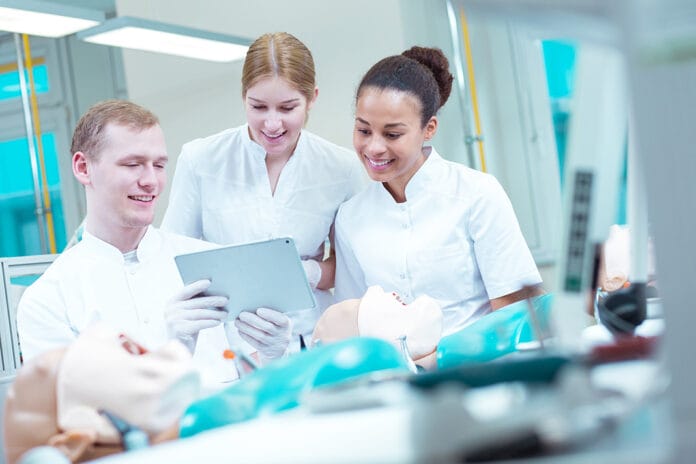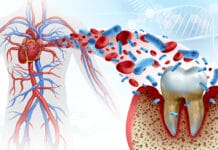After a long, anticipating wait, you have been selected to enter hygiene school. You completed all the prerequisites, earned good grades, and now you are here! In two or three years, depending on your program, you will enter the respectable and rewarding dental profession.
Two to three years does not sound like much, but trust me, the days are packed in a dental hygiene program. Once you enter, things start rolling quickly, and you hardly get a breather. The intensity of the schedule, as well as the academic and clinical expectations that the program has of incoming students, comes as a shock to many who enter hygiene school. You not only have to be book-smart to earn good grades, but you also need to have great social skills to treat patients and fine-tuned motor skills to learn new grips for instrumentation.
All of this can be overwhelming and can lead to anxiety and self-doubt. But fear not, you are not alone. If you ask any hygienists if hygiene school was hard, I guarantee many of them will nod in affirmation. People will give you advice to prioritize self-care, compartmentalize life outside hygiene school and life within it, and be organized to stay ahead in your studies.
These suggestions are great advice, and you should consider them. However, the following are five tips that I want to share to help you ease into the amazing world of hygiene school.
1) Do not procrastinate
I remember when I was completing my prerequisite courses, where I could leisurely choose the time and number of courses for a given semester. Once in hygiene school, you have a predetermined set of courses per semester. Assignments, quizzes, and competencies start the very first week.
Make a habit of finishing assignments as soon as you possibly can. I sometimes noticed there used to be many assignments, and they would be staggered in such a way that, if you were not careful, you could easily miss the due date. My organized classmates would write the due dates in their planners. I completed school work as it was assigned, as I was too scared to forget.
If an athlete falls at the very beginning of a race, it is next to impossible to catch up, especially if it’s a sprint. Trust me, these hygiene school semesters are sprints. Do not leave things for the last minute.
2) All subjects are connected
One thing I noticed during the very first semester was that there is connectivity and flow among all the subjects they teach you. In radiology, you will study the shape of a mandibular molar and all the landmarks around it. Then, in anatomy, they will teach you its eruption times and how it looks. Following that, while learning oral care, they will show why there is more plaque accumulation on that molar due to its anatomy.
Staying focused on one subject will benefit you in another as well. You will learn the anomalies in the development of teeth, which will later be repeated in oral pathology.
The point I want to make is that studying well for one subject, will help you with your other subjects, and that will make things less overwhelming.
3) United we stand
If I say I would have succeeded without the help of my classmates, I would be lying. Our class underwent hygiene school during the pandemic. Hygiene school was hard, but adding the uncertainty of the pandemic to the mix and the stress level goes off the charts. Without the strong group that we were, I am sure it would have been impossible to go through it.
Everyone is good at something. Some people are great organizers, others are awesome teachers, some are great listeners, and some are great leaders. Every class has a combination of all of them, so try to take advantage of it.
I was not very good at doing some computer-related things and would heavily rely on my classmates who were good at it. Then there were classmates who kept track of all the assignments and would regularly remind us of what was due. Some of us were the cheerleaders who kept positive vibes flowing, or if someone needed a shoulder to cry, it was there for them.
No one who will understand you better than your classmates, as they are going through the same journey. By helping each other, you divide the stress. Try to be generous, and you will receive generosity. Don’t ignore the power of having a strong, reliable peer group.
4) Don’t hesitate to ask a teacher
I don’t know why, but I feel there is a great deal of hesitation when it comes to asking for teacher guidance. You cannot self-study yourself through hygiene school. You depend on your teachers. The teachers are there to guide you, so don’t be shy in asking about things you don’t understand. They all know that you are learning new skills, and it takes time for muscle memory to kick in.
So, hear their advice. Don’t get frustrated if they can grasp and adapt an instrument with ease while you can’t figure out the head or the tail of it. I remember my struggles and frustration with instrumentation and how my teachers would literally hold my hand and guide me into the proper grasp and adaptation.
Understanding certain things in didactic studies can also take a toll on the brain. Ensure you understand before the teacher moves forward. I was lucky because, at my college, some of our teachers even counseled students who were going through a rough patch. They have been through it and know a lot about the mindset you are in. Don’t be shy and take their help. They will be more than happy to help you.
5) Don’t be afraid of the “F” word
The “F” word I am pointing to is “failure.” Remember how I said everyone is good at something? Well, in turn, no one is good at everything, and hygiene school demands a whole lot of everything.
During your time at hygiene school, there will be quizzes, tests, or competencies that you might fail. But you know what? It is perfectly okay because no one is good at everything.
As previously mentioned, there are didactic studies, social skills, and motor skills that you need to learn in order to become a hygienist. No one can master all of that immediately. So, yes, you will struggle with one thing or the other.
Don’t get discouraged, and just be steadfast. You are bombarded with learning so many skills, and every now and then, the brain will refuse to comply. Think of the toddler who has just learned to walk. Have you noticed how many times they fall? Imagine if that toddler gives up after the first one or two falls. Will they ever learn to walk?
Look at the big picture, stay positive, accept constructive criticism, and learn from minor failures. Instead of losing hope, remember to be humble, give yourself grace, keep working toward improvement, and tell yourself that you will improve.
In Closing
Hygiene school is hard, but you were chosen for it, which means someone saw in you the potential to overcome all the challenges that this field throws your way. Have faith in yourself, and this mountain will be yours to conquer.
Before you leave, check out the Today’s RDH self-study CE courses. All courses are peer-reviewed and non-sponsored to focus solely on high-quality education. Click here now.











